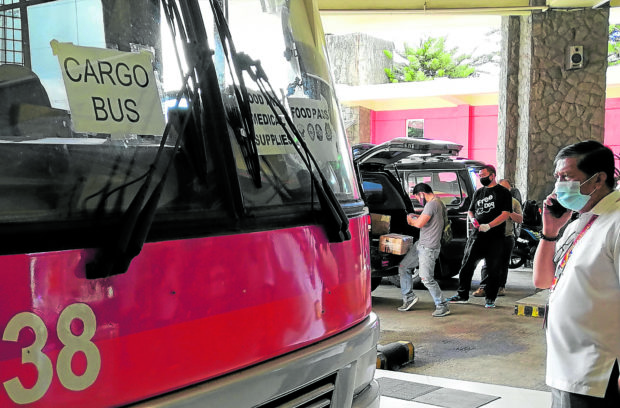
BAGUIO DELIVERY Victory Liner uses four buses in its fleet for a freight service to transport essential goods and other products from Baguio City to Metro Manila and vice versa. —EV ESPIRITU
More than 7,000 bus drivers and conductors, including ticket inspectors, may lose their jobs as the coronavirus pandemic forces drastic changes in mass transportation, such as the shift to cashless transaction.
As the government eases quarantine protocols, more bus companies are poised to resume operations this month but only at half of their normal passenger capacities to maintain physical distancing onboard and with shorter routes.
In Cavite province, 46 of 100 buses of Jasper Jean Bus Liner have resumed daily trips after nearly three months of lockdown, according to its president, Edwin Costes.
The company, however, operates on a limited scope as it has to follow a new route from Dasmariñas City in Cavite to the Parañaque Integrated Terminal Exchange. The new route is only half of its previous one that extended up to Navotas City in Metro Manila, Costes said.
Cashless
Under the route rationalization in preparation for mass transport resumption in Metro Manila on June 22, provincial buses from northern Luzon will be allowed only up to the Philippine Arena complex in Bocaue, Bulacan province, while those from the south will be allowed only up to Santa Rosa City in Laguna province.
Costes said his company was observing the “one-seat-apart” scheme, along with other safety measures like regularly disinfecting buses, wearing face masks for the driver, conductor and passengers, and using thermal scanners.
Fare is collected at the terminal, but the government prefers bus companies to later install the automatic fare collection system (AFCS), “to minimize, if not avoid the risk of exposure” to the virus, the Land Transportation Franchising and Regulatory Board (LTFRB) said in its memorandum circular issued on May 14.
The AFCS, likened to reloadable beep cards used in Metro Manila’s railways, will likely replace bus conductors and ticket inspectors.With only about 4,600 buses in Metro Manila alone, some 7,000 employees may lose their jobs, according to Costes and Homer Mercado, owner of HM Transport Inc.
“Our funds are being depleted [while] our other buses are still being used by the government [to ferry stranded residents and medical front-liners],” Costes said.
Del Monte Land Transport Bus (DLTB), whose buses ply routes in Laguna province, Bicol region and the Visayas, has begun reconfiguring its vehicles by installing seats separated into cubicles with acrylic fiberglass sheets.Aside from minimizing physical contact, reconfiguring bus seats (from previously rows of two or three seats) helps operators plug company losses due to the lockdown, said Narciso Morales, DLTB president.
Health protocols
“For example, [under the new protocol] a [normally] 50-seater bus will be allowed to carry only 25 passengers. But if [seats are] reconfigured, it can have 36 passengers instead,” he said. In Zambales province, Victory Liner Inc. (VLI) has resumed operations since June 4 but was limited to its route from Olongapo City to Sta. Cruz town.
Passengers were required to wear face masks throughout the trip and asked to fill out passenger locator forms.
VLI is one of the country’s largest bus companies, with 917 buses that ply routes in Zambales, Pangasinan, Bulacan, Pampanga and Bataan provinces, Baguio City and Cagayan Valley.
Only its freight service from Manila to Baguio and vice versa remains operational during the quarantine, according to Apollo Padagas, VLI terminal master in Baguio.
Despite incurring losses due to the ban on public transportation, the company has not terminated any of its employees, Padagas said.
“Our drivers and other employees, even the janitors, are still getting their regular salaries. Although we have yet to resume operations, we’re implementing alternate work schedules so our staff could keep their jobs,” he said.
In Bataan, Genesis Transport Service Inc. had been deploying buses for its Balanga City-Manila route since the province shifted to modified general community quarantine on June 1.
Provincial bus companies are ready to operate and will follow health protocols and guidelines imposed by the Department of Health and the LTFRB, said Alex Yague, executive director of Provincial Bus Operators’ Association of the Philippines.
—Reports from Maricar Cinco Joanna Rose Aglibot, EV Espiritu, Greg Refraccion and Tonette Orejas